 W
WAppleWorks is an integrated office suite containing a word processor, database, and spreadsheet. It was developed by Rupert Lissner for Apple Computer, originally for the Apple II platform and launched in 1984, and was later reworked for the Macintosh platform.
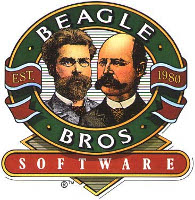 W
WBeagle Bros was an American software company that specialized in creating personal computing products. Their primary focus was on the Apple II family of computers. Although they ceased business in 1991, owner Mark Simonsen permitted the Beagle Bros name and logo to be included on the 30th anniversary reboot of I. O. Silver, released on December 12, 2014 by former Beagle programmer Randy Brandt.
 W
WContiki is an operating system for networked, memory-constrained systems with a focus on low-power wireless Internet of Things devices. Extant uses for Contiki include systems for street lighting, sound monitoring for smart cities, radiation monitoring, and alarms. It is open-source software released under a BSD license.
 W
WGarry Kitchen's GameMaker is an integrated development environment for the Commodore 64, Apple II, and IBM PCs, created by Garry Kitchen and released by Activision in 1985. It is one of the earliest all-in-one game design products aimed at the general consumer, preceded by Broderbund’s The Arcade Machine in 1982. Several sample files are included: a demo sequence featuring animated sprites and music, a recreation of Pitfall!, and a birthday greeting.
 W
WgeoPublish is a desktop publishing program designed by Berkeley Softworks for the GEOS environment.
 W
WGEOS is a discontinued operating system from Berkeley Softworks. Originally designed for the Commodore 64 with its version being released in 1986, enhanced versions of GEOS later became available in 1987 for the Commodore 128 and in 1988 for the Apple II family of computers. A lesser-known version was also released for the Commodore Plus/4.
 W
WBill Budge is an American video game programmer and designer. He is best known for the Apple II games Raster Blaster (1981) and Pinball Construction Set (1983).
 W
WMultiplan was an early spreadsheet program developed by Microsoft. Known initially by the code name "EP", it was introduced in 1982 as a competitor for VisiCalc.
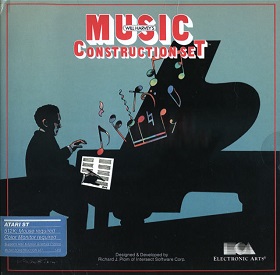 W
WWill Harvey's Music Construction Set (MCS) is a music composition notation program designed by Will Harvey for the Apple II and published by Electronic Arts in 1984. Harvey wrote the original Apple II version in assembly language when he was 15 and in high school. MCS was conceived as a tool to add music to his first and only published software, an abstract shooter called Lancaster for the Apple II.
 W
WApple Pascal is an implementation of Pascal for the Apple II and Apple III computer series. It's based on UCSD Pascal Just like other UCSD Pascal implementations, it ran on its own operating system.
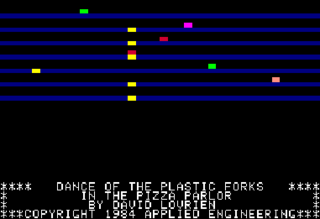 W
WPhasor is a stereo music, sound and speech synthesizer created by Applied Engineering for the Apple II family of computers. Consisting of a sound card and a set of related software, the Phasor system was designed to be compatible with most software written for other contemporary Apple II cards, including the Sweet Micro Systems Mockingboard, ALF's Apple Music Synthesizer, Echo+ and Applied Engineering's earlier card Super Music Synthesizer.
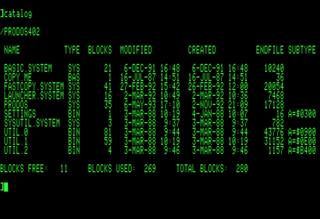 W
WProDOS is the name of two similar operating systems for the Apple II series of personal computers. The original ProDOS, renamed ProDOS 8 in version 1.2, is the last official operating system usable by all 8-bit Apple II series computers, and was distributed from 1983 to 1993. The other, ProDOS 16, was a stop-gap solution for the 16-bit Apple IIGS that was replaced by GS/OS within two years.
 W
WQuicken is a personal finance management tool developed by Quicken Inc.. On March 3, 2016, Intuit announced plans to sell Quicken to H.I.G. Capital; terms of the sale were not disclosed.
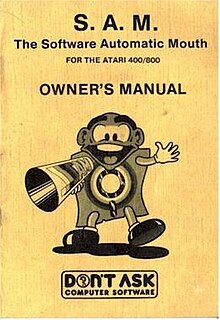 W
WSoftware Automatic Mouth, or S.A.M., is a speech synthesis program developed by Mark Barton and sold by Don’t Ask Software. The program was released for the Atari 8-bit family, Apple II, and Commodore 64. Released in 1982, it was one of the first commercial all-software voice-synthesis programs.
 W
WTellStar was the first graphical astronomy program available for personal computers. It was sold from 1980-1986 by Scharf Software Services, originally for the Apple II then later for IBM PC compatibles. It came in two versions: Level 1, which only plotted the Northern Hemisphere; and Level 2, which was able to plot the entire sky.
 W
WVisiCalc was the first spreadsheet computer program for personal computers, originally released for the Apple II by VisiCorp in 1979. It is often considered the application that turned the microcomputer from a hobby for computer enthusiasts into a serious business tool, prompting IBM to introduce the IBM PC two years later. VisiCalc is considered the Apple II's killer app. It sold over 700,000 copies in six years, and as many as 1 million copies over its history.
 W
WZBasic is a compiler which was first released by Simutek in 1980. The combined efforts of Andrew Gariepy, Scott Terry, David Overton, Greg Branche, and Halbert Laing led to versions for MS-DOS, Apple II, Macintosh, CP/M, and TRS-80 computers. ZBasic is a fast and efficient BASIC compiler with an integrated development environment. It aims to be used as a cross-platform development system, where the same source code can be compiled to different platforms without any modifications.